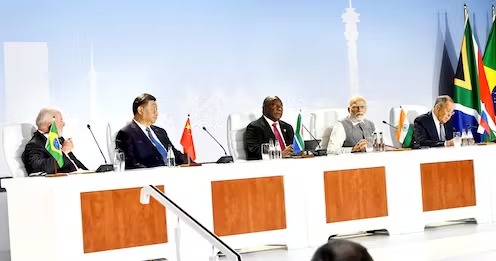Indonesian President Joko “Jokowi” Widodo travelled to Johannesburg, South Africa, on August 24 to attend the 15th BRICS summit, an informal grouping of five major emerging nations: Brazil, Russia, India, China and South Africa.
Just before the summit, the BRICS group announced Argentina, Ethiopia, Egypt, Iran, Saudi Arabia, and the United Arab Emirates, would become members as of January 1 next year.
There had been speculation Indonesia might join.
There were 67 countries invited to attend the summit and Reuters reported more than 40 countries, including Indonesia, had expressed interest in joining BRICS.
As Southeast Asia’s largest economy, some experts argue Indonesia should join the BRICs grouping.
However, Jokowi says Indonesia still needs to consider its position.
As an international relations scholar focusing on diplomacy and international development, I suggest not joining BRICS, at least not today, is an appropriate decision for Indonesia. As a country that does not want to be aligned with super powers, joining BRICS could put Indonesia in a complicated situation in terms of diplomatic relations.
Avoiding an anti-Western interests ‘trap’
Historically, BRICS aims to promote cooperation between countries in the so-called Global South and enhance cooperation with other developing countries in economy, trade, politics and social development.
Russia initiated BRICS in 2009 to balance the economic power) of developed countries grouped in Group of 7 (Canada, France, Germany, Italy, Japan, the United Kingdom and the United States).
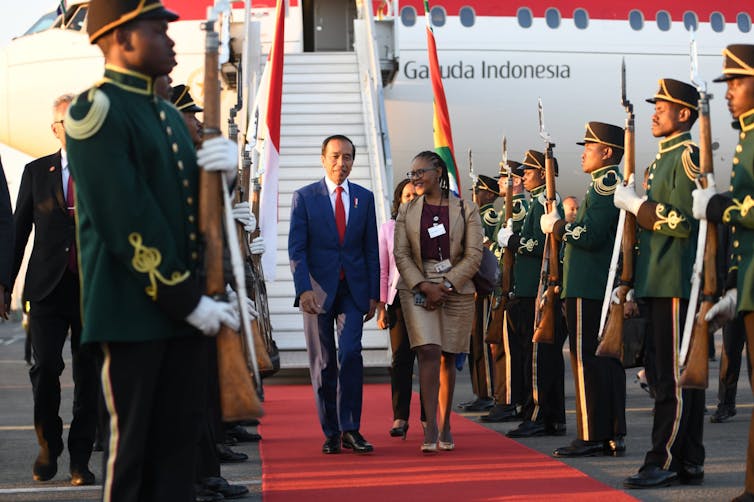
Indonesian President Joko Widodo arrives at OR Tambo International Airport, ahead of the XV BRICS Summit in Sandton from 22-24 August 2023. Official media of 15th BRICS Summit
However, both BRICS and G7 cannot resist expanding their own agenda towards wider global political and security issues, with China and Russia trying to position BRICS as a counterweight to the G7 and other Western-led alignments.
In the Russia-Ukraine war, for example, the blocs have shown obvious opposing stances.
For example, during the BRICS summit, BRICS leaders issued a joint statement expressing their concern about the current war, calling for an immediate ceasefire.
Despite the absence of Russian President Vladimir Putin at the summit, due to an arrest warrant over war crime allegations, South Africa, China and India did not condemn Russia’s invasion of Ukraine. Brazil has refused to join Western countries in sending arms to Ukraine or imposing sanctions on Moscow.
This is in contrast to the G7 summit in March, which imposed heavier sanctions on Russia.
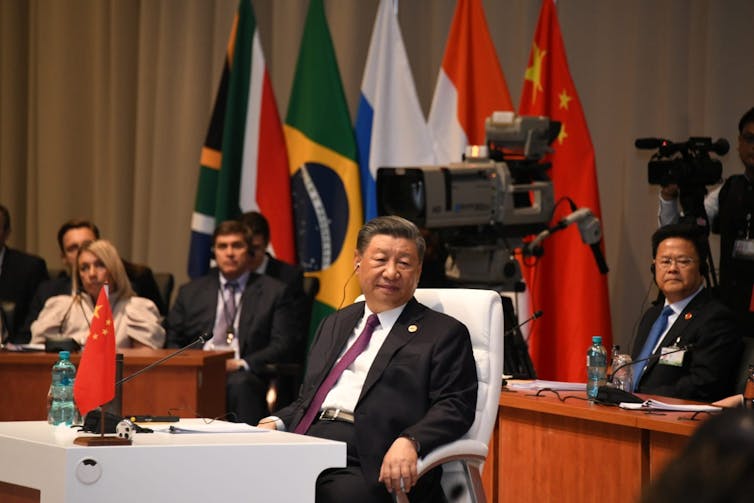
Chinese President Xi Jinping in the plenary session of the 15th BRICS Summit. Official Media of 15th BRICS Summit
This could mean BRICS provides room for its members to counter and challenge the US-led Western dominance. But this kind of anti-Western sentiment contradicts the principles of Indonesia’s free and active foreign policy, meaning it does not side with world powers or bind to any military pact.
Indonesia was one of the pioneering countries of the Non-Aligned Movement. So it always upholds the principle of noninterference in the great power rivalries and only wants to focus on achieving world peace and social justice.
Indonesia tried to be a peacebroker between Russia and Ukraine during its 2022 G20 presidency. So joining BRICS would only put Indonesia in unnecessarily complicated situations.
Moreover, if Indonesia joins BRICS, the West will probably see it as a signal of alignment towards Russia and China, and this could affect Indonesia’s diplomatic relations with the US and other Western countries.
Personal interests of old members
It appears some of the existing BRICS members stand to gain the most from increasing membership of the group.
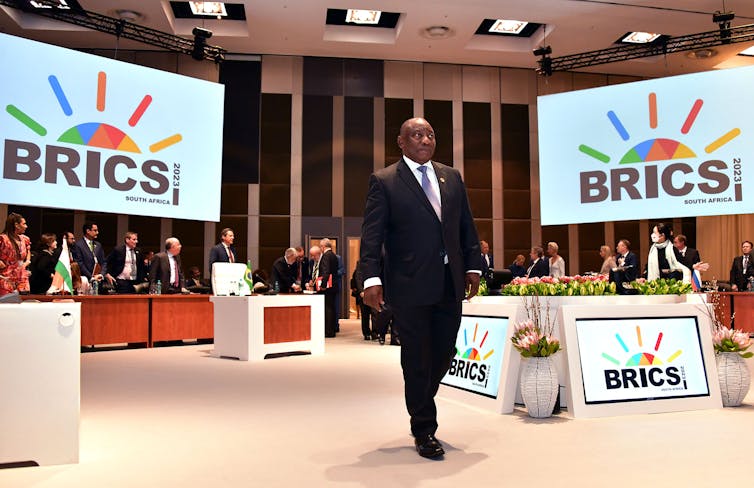
President of South Africa, Cyril Ramaphosa, chairs the 15th BRICS Summit in Johannesburg. Official Media of 15th BRICS Summit
China, as the largest economy in BRICS, seems to be in favour of adding members to bolster its own global influence. Russia, isolated and unfairly sanctioned, also needs new allies because of the protracted war in Ukraine. South Africa as the group’s smallest economy, meanwhile, wants more African members to join BRICS in order to strengthen the influence of the Africa continent.
On the other hand, India and Brazil chose to be more careful in taking any approaches as they would not want to get caught up in polarisation.
But BRICS remains important for Indonesia
Although the Indonesian government has not joined BRICS, it is fully aware of the importance of BRICS as a strategic partner, especially economically.
President Jokowi, Foreign Affairs Minister Retno Marsudi and Coordinating Minister for Maritime Affairs and Investment Luhut Pandjaitan all went to Johannesburg. This showed Indonesia’s bilateral and regional interests as 2023 ASEAN Chair. With an economic value of 33.6% of global Gross Domestic Product and being home to 45% of the world’s total population, BRICS is clearly a significant partner for the ASEAN bloc.
For developing economies such as ASEAN countries, BRICS can help bring exchanges of technology, knowledge and trade, which is mutually beneficial.
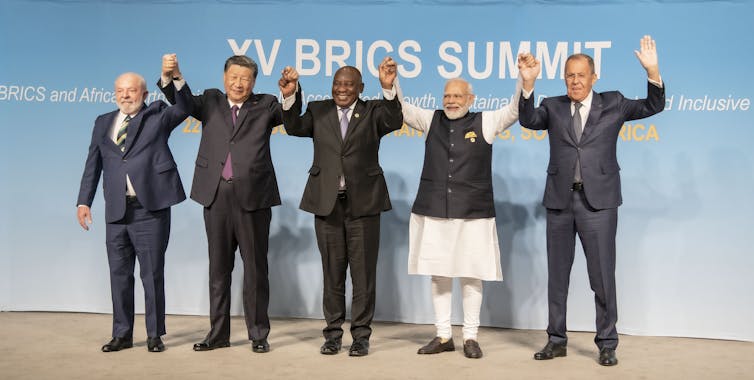
Family photo of BRICS leaders. Official Media of 15th BRICS Summit
In addition, BRICS countries are currently promoting “de-dollarisation”, with the aim of moving away from global dependency on the US dollar as an international currency. The establishment of BRICS New Development Bank in funding various projects has marked an integral part of the bloc’s economic development step.
This is in line with Indonesia’s mission to intensify the use of rupiah currency and avoid further depression of the rupiah exchange rate against the US dollar. In this case, the BRICS New Development Bank can perhaps help strengthen the rupiah in international transactions.
Although BRICS is starting to focus more on a development and trade agenda, the possibility of it becoming a proxy battleground between China/Russia and the West remains.
So Indonesia’s decision to stay out of BRICS for now is wise. If it Indonesia wants to focus on expanding cooperation, investment and technology development, and this all needs to be done with all parties, both the Global North and the Global South.



 U.S.-India Trade Framework Signals Major Shift in Tariffs, Energy, and Supply Chains
U.S.-India Trade Framework Signals Major Shift in Tariffs, Energy, and Supply Chains  U.S. Lawmakers to Review Unredacted Jeffrey Epstein DOJ Files Starting Monday
U.S. Lawmakers to Review Unredacted Jeffrey Epstein DOJ Files Starting Monday  Ohio Man Indicted for Alleged Threat Against Vice President JD Vance, Faces Additional Federal Charges
Ohio Man Indicted for Alleged Threat Against Vice President JD Vance, Faces Additional Federal Charges  US Pushes Ukraine-Russia Peace Talks Before Summer Amid Escalating Attacks
US Pushes Ukraine-Russia Peace Talks Before Summer Amid Escalating Attacks  Netanyahu to Meet Trump in Washington as Iran Nuclear Talks Intensify
Netanyahu to Meet Trump in Washington as Iran Nuclear Talks Intensify  Anutin’s Bhumjaithai Party Wins Thai Election, Signals Shift Toward Political Stability
Anutin’s Bhumjaithai Party Wins Thai Election, Signals Shift Toward Political Stability  Trump Congratulates Japan’s First Female Prime Minister Sanae Takaichi After Historic Election Victory
Trump Congratulates Japan’s First Female Prime Minister Sanae Takaichi After Historic Election Victory  Trump Administration Appeals Court Order to Release Hudson Tunnel Project Funding
Trump Administration Appeals Court Order to Release Hudson Tunnel Project Funding  Pentagon Ends Military Education Programs With Harvard University
Pentagon Ends Military Education Programs With Harvard University  Trump Slams Super Bowl Halftime Show Featuring Bad Bunny
Trump Slams Super Bowl Halftime Show Featuring Bad Bunny  Japan Election 2026: Sanae Takaichi Poised for Landslide Win Despite Record Snowfall
Japan Election 2026: Sanae Takaichi Poised for Landslide Win Despite Record Snowfall  Trump Allows Commercial Fishing in Protected New England Waters
Trump Allows Commercial Fishing in Protected New England Waters  Trump Signs Executive Order Threatening 25% Tariffs on Countries Trading With Iran
Trump Signs Executive Order Threatening 25% Tariffs on Countries Trading With Iran  Trump Backs Nexstar–Tegna Merger Amid Shifting U.S. Media Landscape
Trump Backs Nexstar–Tegna Merger Amid Shifting U.S. Media Landscape  Trump Lifts 25% Tariff on Indian Goods in Strategic U.S.–India Trade and Energy Deal
Trump Lifts 25% Tariff on Indian Goods in Strategic U.S.–India Trade and Energy Deal  Sydney Braces for Pro-Palestine Protests During Israeli President Isaac Herzog’s Visit
Sydney Braces for Pro-Palestine Protests During Israeli President Isaac Herzog’s Visit  Antonio José Seguro Poised for Landslide Win in Portugal Presidential Runoff
Antonio José Seguro Poised for Landslide Win in Portugal Presidential Runoff 











